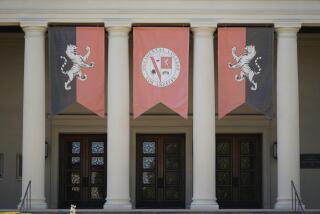Occidental Agrees to Back New Soviet Plastics Plant
- Share via
MOSCOW — Occidental Petroleum Corp., along with a Japanese and two Italian multinational firms, signed a letter of intent Wednesday that is expected to lead to a $6-billion joint venture petrochemical project with the Soviet Union.
Armand Hammer, chairman of Los Angeles-based Occidental, described the joint venture plan, first disclosed last November, as the largest to be proposed here and said it was part of Soviet leader Mikhail S. Gorbachev’s “vision of perestroika (restructuring), and it is important for the development of the Soviet people.”
The project, at the Soviet Union’s Tengiz oil field near the Caspian Sea, would result in a petrochemical complex expected to produce annually 400,000 tons of polypropylene, 600,000 tons of polyethelene and more than 1 million tons of commercial grade sulfur and other plastics materials. The Soviet Union is the world’s largest oil producer.
Hammer, at a news conference here, described the Tengiz field as “one of the largest in the world.”
Occidental’s partners in the proposed venture are the Italian firms, Montedison SpA and Enichem SpA, and Marubeni Corp. of Japan. Hammer said each of the foreign partners will invest $750 million in the project, and the Soviets will put in $3 billion. The Western partners, who together will hold a 49% interest in the joint venture, will utilize bank financing, he said.
The four companies are well known in the Soviet Union for their long and extensive business ties and each has friendly relations with Soviet ministries and industrial organizations. “We’re not here for charitable purposes,” said Hammer, who has been doing business with Moscow since he met the first Soviet leader, Vladimir I. Lenin, in the 1920s. “We, each of the four companies, expect to make profits.”
The foreign partners will sell about half of the complex’s products, while the Soviets will sell their share either domestically or on the world market.
The letter of intent signed Wednesday commits the Soviet Union and its foreign partners to split the costs 50-50 for a nine-month feasibility study of the entire project. The study begins immediately.
More to Read
Sign up for Essential California
The most important California stories and recommendations in your inbox every morning.
You may occasionally receive promotional content from the Los Angeles Times.










